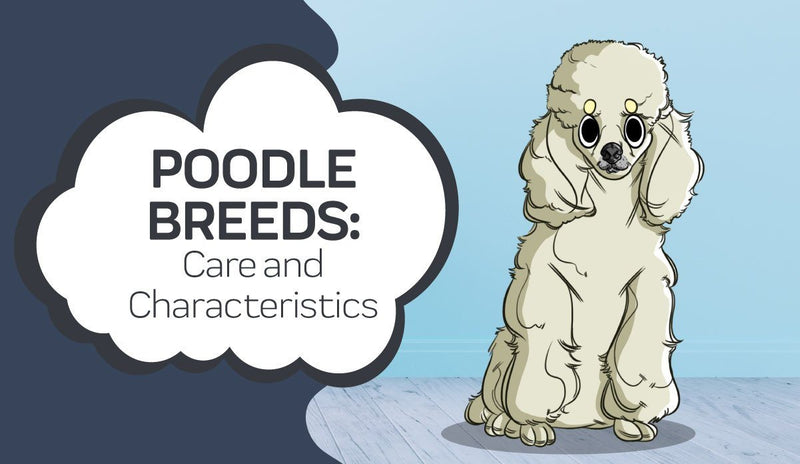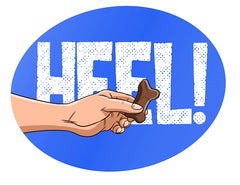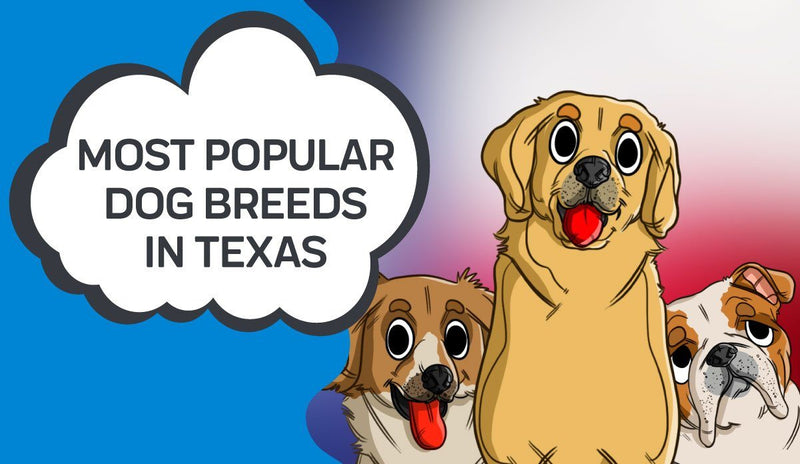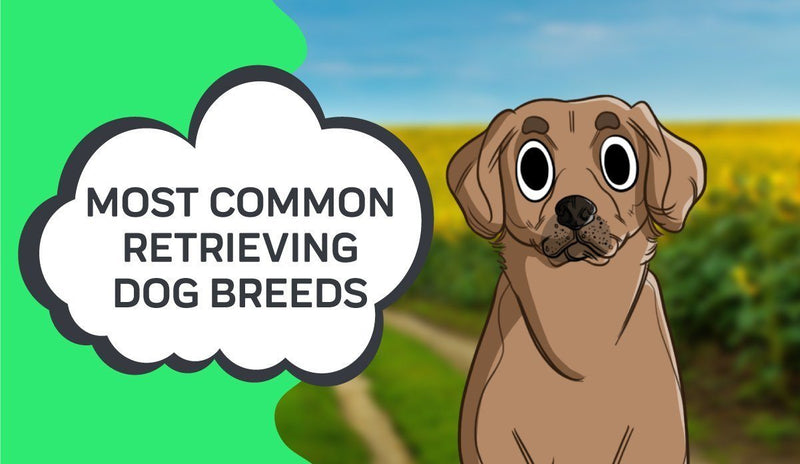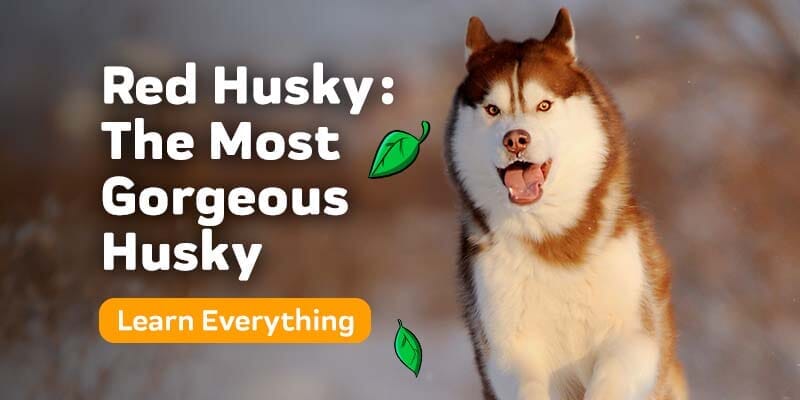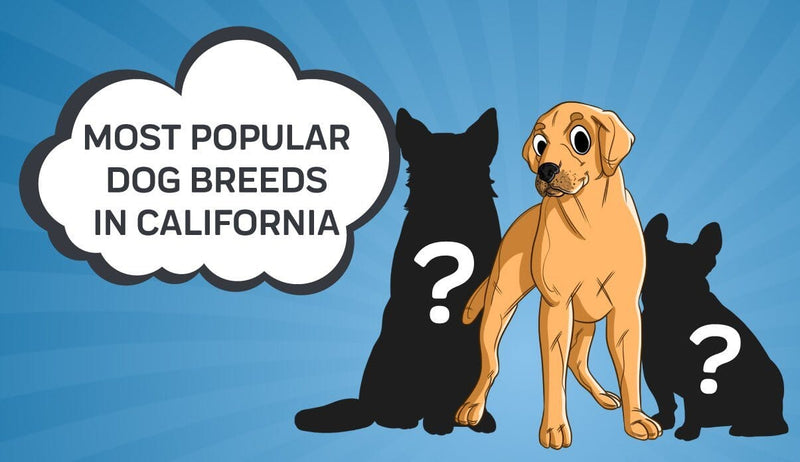Poodles are one of the most popular dog breeds, so it isn't surprising if you are considering one as your next pet. It is important though to always research a dog's breed before or after getting a dog to ensure you know how to properly care for it. Their unique temperament and anatomy may greatly impact how you should plan for their mental and physical health, as well as to ensure they will be good pets to interact with you and your family. Poodle breeds, including Standard, Miniature, and Toy poodles, make agreeable, fun, and easy pets, when properly trained and groomed.
Overview of Poodle Breeds
No one is quite sure where poodles originated. It may have been Japan. They spent some time in Germany before ending up in France and becoming one of the most desired breeds in the 15th century, a treasure for French royalty and nobility.
Even then, there were three types of poodles, the standard poodle, the miniature poodle, and the toy poodle. They are the same in almost every way except for size. The standard poodle measures more than 15" tall at the shoulders, up to 22 - 27", while a miniature poodle will measure between 11" and 15", and a toy poodle will be even smaller.
Besides delighting the French elite, Standard poodles were predominantly used by duck hunters and other people who hunted fowl because they were highly trainable with great stamina, excelling at retrieving the fallen birds. They then began being used in circuses, again as they were highly trainable and didn't mind being kept indoors a lot.
Registered by the AKC as an official dog breed in 1887, including miniature and toy poodles, they are listed as the 7th most popular dog breed. They are also the national dog of France.
What group are poodles in?
Knowing a dog breed's group can help you understand them better. Working dogs and herding dogs have unique needs, for instance. Poodles may be a bit of a stumper. What group do they belong in?
Poodles are classified in the Non-Sporting Group. This is a fairly general category for dogs that don't really fit into other groups. Poodles do have a history as hunting dogs, but this is not the majority of their heritage and plays a fairly small part in their behavior and care. What this means is that rather than using a group to help you understand your poodle you just need to get to know the poodle breed and go from there.
Poodle temperament
Poodles are thought of as dignified and maybe even snobby because of their posh lineage. It is somewhat true but in other ways not.
Poodles are unusually intelligent, and intelligence does often lend itself to dignified and confident dog personalities. They are the types of dogs who don't love everybody, preferring their family members and sometimes one family member, but that doesn't mean they are necessarily unfriendly. They are very agreeable about training and living spaces, making them great for people who live in apartments or small homes, but does mean you need to be willing to commit to routine mental stimulation. Though they're pretty dogs and maybe even considered prissy, they make good watchdogs. They aren't aggressive but they are protective over their family and will definitely alert you to strangers. They are prone to anxiety and do not like to spend time alone. Poodles do not make good pets for people who will have to leave them home alone for hours.
Poodles do require socialization, exercise, and training to have the positive qualities you desire. Without exercise and training, they'll be ill-behaved as their needs for structure won't be met. They also require socialization with people, animals, and children to interact in a desirable fashion with all of these groups and not become "aloof." While your poodle will love to spend time with you and you alone if you also desire it, you will need to regularly socialize them with others to ensure good behavior. This is particularly important if you intend to eventually have children in the house with a poodle. They can be great with children, if they are raised to be.
Poodle training
Poodle intelligence must be stimulated for them to be happy and well-behaved. You don't have to be constantly driving them, but they do require obedience training by you or a professional. The training should be upheld by you. This will not be difficult as poodles are so intelligent and naturally agreeable that they will quickly absorb, retain, and obey commands. They require plenty of stimulating toys and play, and you probably want to every once and a while teach them something new.
It is best to use the positive reinforcement method with poodles. They don't need you to be too aggressive with them, and it will stress them out.
Poodle exercise
Exercise is important to poodles. They need to use up their energy and get tired, but it doesn't require a lot to make that happen. 30 minutes of exercise a day should be sufficient.
Your poodle will love long walks, runs, swimming, and playing games. They'll also chase small animals.
Poodle grooming

The biggest consideration for poodle care, besides preventing separation anxiety, that's pretty high too, is grooming. This is not about vanity. Poodles require grooming to stay cool, comfortable, and healthy.
Poodles don't have an undercoat, so they don't do much shedding and are great for people with allergies, but that also means their coats require a lot of maintenance to stay matt and dirt free. Matts and the dirt that collect in and under them can cause bothersome and dangerous skin conditions for your poodle.
If you want a poodle because you want a show dog or want it to look like a fancy fashion poodle, you can certainly do that, but know that it is expensive. They weren't associated with royalty for no reason.
You will need to brush your poodle daily, groom them monthly, and look for signs of skin problems. Most poodle owners choose the sporting or puppy cuts for a great, all-purpose look.
Unfortunately, all poodle grooming is expensive. It's certainly less so if you aren't going to show quality, but it's still more than many people want to or feel like they can afford to spend. Some people learn to groom their poodles themselves, but it's difficult. Prepare to invest a lot of time to learn how to groom your poodle correctly. That's why it's expensive because it's complicated.
Because grooming is such an important, and regular, part of a poodle's life, you want it to be easy and enjoyable for them and whoever's doing the grooming. Get your poodle used to being handled the way they will have to be to be groomed by handling their paws and brushing them when they are puppies. Do it considerately. You don't want to give them a negative association with being groomed.
Trimming their nails is not a huge issue. They normally take care of themselves through the wear of an active life.
Your poodle may have an increased need for dental care. This is of particular concern with toy and miniature poodles because their mouths are so small. Smaller mouths make tighter spaces that are ideal breeding grounds for bacteria that cause tooth decay and periodontitis. It is important to brush your toy or miniature poodle's teeth 2 to 3 times a week with a dog-friendly toothpaste. Never use human toothpaste, though you can use baby toothbrushes. Your standard poodle may need toothbrushing too. You can make tooth brushing easier by getting them used to you handling their mouths when they are small. Gently touch puppies' mouths and stroke their gums so tooth brushing will seem perfectly normal later.
Poodles have sensitive eyes, and their eyes may water a lot. Make sure their hair stays out of their eyes and that you are mindful of allergens and irritants. You may have to think about tear stains around their eyes.
Poodle diet
They need 2 to 3 cups of high-quality dog food per day in two equal meals, but they are finicky about what they eat. It may take some trial and error and patience to determine what they will eat.
Poodle health problems
Poodles are surprisingly hardy dogs.
The poodle lifespan is 12 to 15 years. Larger poodles may not live quite as long as toy and miniature poodles. That means the standard poodle may be closer to the 12 ends of that range while the smaller poodles will be more likely to reach the 15 ends.
The most pressing issue for poodles is skin problems or overheating from poor grooming. That is why it is crucial for you to regularly and correctly groom your poodle. You should also notice while petting and brushing them, or bathing and grooming them, if they have odd-looking areas on their bodies, icky or poor hair, or are inexplicably tender in certain areas.
There is a slightly higher prevalence in poodles of eye problems like retinal atrophy, cataracts, or partial or complete blindness for other reasons.
They are also slightly prone to hip dysplasia, particularly Standard Poodles because they are larger. This is a displacement between their hip and femur that can cause pain, abnormal gait, or paralysis. They may also develop other joint issues.
There is also a slightly higher prevalence of epilepsy. This produces seizures similar to humans, though they may appear in ways you wouldn't expect. Your poodle may jump up or run like something is after them, convulse, or simply collapse.
Anxiety is a problem with poodles, most notably separation anxiety. They should never be left alone for long lengths of time, even for work. Dog sitters probably won't cut it because they don't get attached to just anybody. They want who they want. Anxiety is sad, but it also leads to disruptive and destructive behaviors and can lead to other health problems.
Getting a poodle
If you've already met a poodle you love, then the choice is made for you. But if you're still in the planning stages, you might want some help determining which type of poodle is right for you and how to go about getting one.
Poodle popularity means many people want in on the poodle breeding game. This demand attracts disreputable breeding. It is always important to thoroughly check a dog breeder, but you want to be even more aware of the potential for unethical behavior when going to a breeder of such in-demand dogs.
If you would like to adopt a dog, you'll be glad to know that it is possible to find purebred dogs at shelters. If glad is the right word. It's sad that any dog has to be in a shelter, but it is convenient for those who want to help homeless animals and want a specific dog breed. Because poodles are so popular, they aren't likely to stay there long unless they are old or have health problems. Take that into consideration when planning how vigilantly to search and deciding how to set you honestly are on adopting a poodle in need.
While all poodles are very similar in most ways, there are some differences that may help you determine whether you want a standard, miniature, or toy poodle. Standard poodles are more likely to develop hip dysplasia and to not live as long as smaller poodles. Miniature poodles are usually the most active of the three types of poodles. Toy poodles are not good fits for houses with small children because the children don't know how to handle them and may hurt them. Both miniature and toy poodles have stricter dental demands because of their small mouths, prone to harboring bacteria. Standard poodles make a grander statement and are your most traditional poodle, but of course everyone thinks miniature and toy poodles are cute enough to look like plush toys.
How CBD Oil May Help with Poodle Care
CBD oil is growing in popularity as a natural alternative to traditional treatments for many ailments.
CBD oil may help your poodle with:
- skin conditions
- potential or active infections
- anxiety
- pain and inflammation from joint problems
- seizures
- side effects of medications and treatments
CBD oil is commonly used by people and given to pets in an attempt to manage anxiety. Pets may be given treats, capsules, oil tinctures, or extract concentrates as needed or daily.
CBD oil is also used to address pain and inflammation. It can be given orally in any of the above-mentioned forms or applied in a topical form for localized areas.
CBD oil is so well-thought-of as a means to reduce the number and severity of seizures in people that major research was performed and the FDA approved a drug made of CBD oil for epilepsy in humans. It is also commonly used for pets for the same purpose and should be used orally.
Skin conditions cause many problems, irritation, inflammation, itch, pain, and potential for infection. Topical CBD oil is used in an attempt to soothe inflammation, pain, and irritation and create a barrier against infection. It also shows great promise at killing infections that are already present.
Many medications are detrimentally unpleasant or even risky. The pet may suffer while taking the medication or they may not be able to continue traditional treatment. CBD oil may eliminate nausea, vomiting, diarrhea, lack of appetite, lethargy, and many other side effects. CBD oil could help your poodle continue a treatment that is otherwise working for them.
CBD oil in general has not been approved by the FDA because it hasn't undergone enough testing and trials yet. The scientific results are continuing to amaze for the range of illnesses that CBD oil shows promise in managing. User reports are also very positive, some people finding miraculous changes in themselves and their pets.
What has been proven is that humans and many animals have an endocannabinoid system that creates and uses its own cannabinoids to maintain the body's homeostasis and the normal functioning of many of the body's organs. Cannabidiol, the ingredient in CBD oil, works in the body much like its own cannabinoids, addressing deficiencies or giving a boost in times of need.
Innovations from Innovet
We create scientifically backed natural and eco-friendly products to solve pet problems. If you're searching for poodle breeds and poodle care, you may want our CBD oil tinctures, soft treats, crunchy treats, capsules, or balm to address anxiety, skin problems, epilepsy, or joint problems. You may also want to pick up our tear stain remover, dental gel, scent markers for blind dogs, or eco-friendly poop bags.
If you are encountering a pet problem no traditional treatment or natural alternative addresses, let us know. We love to innovate for pets.
Sources:
PoodleThe Essential Guide to Dog Breeds
Life with a Toy Poodle
Poodle
Toy Poodle










